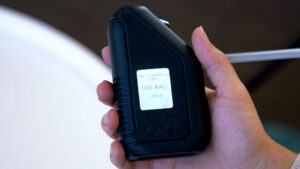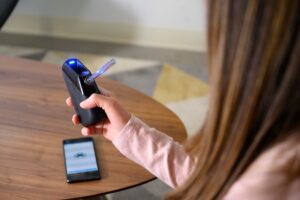Soberlink, a widely used alcohol monitoring system, serves as a vital tool in ensuring sobriety for individuals undergoing recovery or legal obligations. However, for some, the desire to bypass its effectiveness can lead to attempts to cheat the system. This post will explore various strategies individuals may employ on how to cheat Soberlink and the potential risks associated with these actions.
Attempting to cheat Soberlink, an alcohol monitoring system designed to ensure sobriety, is not only unethical but also risky. Some may try to deceive the device by using mouthwash, breath mints, or even breathing techniques. However, such attempts are often futile as Soberlink is equipped with features to detect such tampering, including temperature sensors and advanced algorithms.
Moreover, dishonesty undermines the purpose of the system, which is to support individuals in their recovery journey or legal obligations. It’s crucial to recognize the importance of honesty and integrity while utilizing Soberlink, as attempting to cheat not only jeopardizes one’s progress but also undermines trust and accountability.
CONNECT WITH A PROFESSIONAL HACKER
Common Methods of Cheating Soberlink

While it’s crucial to understand common methods individuals may attempt to bypass this system, it’s equally important to emphasize that such actions are strongly discouraged. Below are common methods individuals may use to cheat Soberlink, despite the ethical and legal risks involved.
- Tampering with the Device: Some individuals may try to tamper with the Soberlink device itself, such as by disassembling it or interfering with its sensors, in an attempt to manipulate its functionality or alter the results.
- Using a Substitute Liquid: Others may try to deceive Soberlink by providing a sample other than their breath. This could involve using substances like mouthwash or compressed air to produce false readings.
- Manipulating the Breath Sample: Individuals may attempt to manipulate the breath sample provided to Soberlink by exhaling less air into the device or blowing air from a source other than their lungs, such as using a balloon or handheld device.
- Strategic Timing: Some may try to strategically time their alcohol consumption to avoid detection during scheduled testing periods, either by consuming alcohol immediately after a test or abstaining for a specific period before testing.
- External Devices: Certain individuals may use external devices or accessories to interfere with Soberlink’s operation or provide false readings, such as devices to mask alcohol breath or electronic gadgets to manipulate signals.
It’s crucial to emphasize that cheating Soberlink not only undermines the purpose of the system but also poses significant risks to personal integrity and legal standing. Instead of seeking ways to cheat the system, individuals should focus on embracing honesty, accountability, and genuine efforts towards sobriety and recovery.
Ethical considerations and legal consequences of cheating Soberlink
Cheating Soberlink, an alcohol monitoring system crucial for promoting sobriety, raises important ethical and legal questions. Attempting to bypass Soberlink not only undermines trust but also carries legal consequences, particularly for individuals under court-mandated sobriety programs. Below are the ethical considerations and legal risks associated with cheating Soberlink.
- Ethical Breach: Attempting to deceive Soberlink violates ethical principles because it undermines the integrity of the rehabilitation process. Rehabilitation relies on trust between individuals undergoing recovery and their support network, including loved ones and professionals. Cheating Soberlink erodes this trust, which can hinder the effectiveness of the rehabilitation journey.
- Legal Penalties: Cheating Soberlink can lead to legal consequences, such as fines, extended probation, or incarceration. This is particularly true for individuals who are under court-mandated sobriety programs where compliance with monitoring systems like Soberlink is a condition of their probation or legal agreement.
- Violation of Court Orders: Tampering with monitoring devices like Soberlink constitutes a violation of court orders. When a court mandates the use of Soberlink as part of a probation or legal requirement, any attempt to cheat the system breaches the terms of the court order. This can complicate legal proceedings and may result in harsher consequences.
- Impeded Recovery: Cheating Soberlink impedes personal growth and recovery efforts. Accountability and adherence to sobriety measures are essential components of the rehabilitation process. By evading accountability and circumventing these measures, individuals hinder their own progress towards achieving long-term sobriety and overall well-being.
- Delayed Rehabilitation: Engaging in cheating behaviors prolongs the rehabilitation process. Instead of focusing on genuine self-improvement and overcoming addiction, individuals who cheat Soberlink continue to engage in harmful behaviors. This delay in addressing underlying issues can impede efforts towards successful rehabilitation and may exacerbate the challenges associated with addiction recovery.
Each point highlights the ethical and legal implications of attempting to cheat Soberlink. Upholding honesty, accountability, and active participation in the recovery journey are essential for achieving successful rehabilitation outcomes.
How to cheat soberlink
Attempting to cheat Soberlink is not only unethical but also carries serious consequences, including legal penalties and setbacks in rehabilitation. However, individuals may still try to bypass the system using various methods:
- Tampering with the Device: Some individuals may attempt to tamper with the physical components of the Soberlink device, such as disassembling it or interfering with its sensors, in an effort to manipulate its functionality or alter the results.
- Using Substitute Liquids: Others may try to deceive Soberlink by providing a sample other than their breath. This could involve using substances like mouthwash or compressed air to produce false readings.
- Manipulating the Breath Sample: Individuals might try to manipulate the breath sample provided to Soberlink by exhaling less air into the device or blowing air from a source other than their lungs, such as using a balloon or a handheld device.
- Timing Strategies: Some may attempt to strategically time their alcohol consumption to avoid detection during scheduled testing periods, either by consuming alcohol immediately after a test or abstaining for a specific period before testing.
- External Devices: Certain individuals may resort to using external devices or accessories to interfere with Soberlink’s operation or provide false readings, such as devices to mask alcohol breath or electronic gadgets to manipulate signals.
It’s crucial to reiterate that cheating Soberlink undermines the purpose of the system and can have significant repercussions. Instead of seeking ways to bypass the system, individuals should focus on embracing honesty, accountability, and genuine efforts towards sobriety and recovery.
Risks and of Cheating Soberlink

Attempting to cheat Soberlink, an alcohol monitoring system crucial for supporting sobriety, entails significant risks. Beyond potential legal penalties, such actions compromise ethical integrity and hinder progress in rehabilitation. Below are the various risks associated with cheating Soberlink.
- Ethical Consequences: Attempting to cheat Soberlink undermines trust and integrity, both within the rehabilitation process and among support networks. It violates ethical principles and can strain relationships with loved ones and professionals.
- Legal Ramifications: Cheating Soberlink can result in legal penalties, including fines, extended probation, or incarceration. Violating court orders by tampering with monitoring devices like Soberlink can complicate legal proceedings and lead to harsher consequences.
- Recovery Setbacks: Cheating Soberlink hinders personal growth and recovery efforts by evading accountability and circumventing sobriety measures. This can delay progress towards long-term sobriety and impede efforts towards genuine self-improvement.
- Damage to Rehabilitation Progress: Engaging in cheating behaviors prolongs the rehabilitation process and perpetuates harmful behaviors associated with addiction. This delay in addressing underlying issues can impede successful rehabilitation outcomes and exacerbate challenges in recovery.
The risks of cheating Soberlink extend beyond immediate consequences, impacting ethical integrity, legal standing, and progress towards sobriety and rehabilitation.
Importance of understanding potential loopholes in the system
Understanding potential loopholes in systems like Soberlink is paramount for ensuring their effectiveness and integrity. By identifying vulnerabilities and addressing them proactively, stakeholders can enhance security, accuracy, and trust in the monitoring process. Below are the importance of comprehending these loopholes and their implications.
- Enhanced Security: Identifying loopholes allows developers and administrators to strengthen the system’s security measures. By addressing vulnerabilities, they can prevent unauthorized access and manipulation, ensuring the system’s integrity and reliability.
- Improved Accuracy: Awareness of potential loopholes enables developers to refine algorithms and detection methods, enhancing the system’s accuracy in detecting and preventing cheating attempts. This ensures that the system provides reliable and trustworthy results, crucial for supporting sobriety and accountability.
- Effective Countermeasures: Understanding loopholes empowers authorities and stakeholders to implement effective countermeasures against cheating attempts. This may involve implementing additional security protocols, conducting regular audits, or enhancing user education to deter individuals from trying to bypass the system.
- Maintaining Trust: By proactively addressing potential vulnerabilities, stakeholders demonstrate their commitment to maintaining trust and transparency in the monitoring process. This helps to preserve confidence among users, administrators, and other stakeholders, reinforcing the system’s effectiveness in promoting sobriety and accountability.
Understanding potential loopholes in systems like Soberlink is essential for enhancing security, improving accuracy, implementing effective countermeasures, and maintaining trust among stakeholders. This ensures the system’s reliability and effectiveness in supporting sobriety and accountability efforts.
Conclusion
While understanding potential loopholes in Soberlink may provide insights into its vulnerabilities, it’s crucial to recognize that attempting to exploit these weaknesses is unethical and can have serious consequences.
Engaging in activities to cheat Soberlink undermines the purpose of the system, which is to support sobriety and accountability. Instead of focusing on how to cheat Soberlink, individuals should prioritize honesty, accountability, and genuine efforts towards sobriety and recovery.
